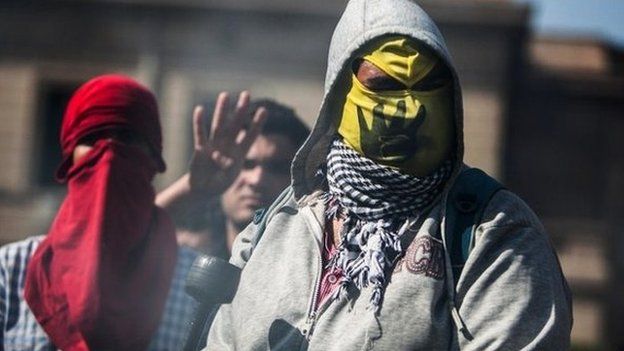UK will not ban Muslim Brotherhood, says David Cameron
- Published
- comments

Membership or association with the Muslim Brotherhood is a "possible indicator of extremism" but it will not be banned, the prime minister has said.
A long-delayed review of the international Islamist network found parts of it had an "ambiguous relationship with violent extremism".
David Cameron told MPs the group's activities would be kept under review.
The group's British lawyers say the Brotherhood will legally challenge the "deeply flawed" findings.
In a statement, the group said the UK's position was unjust.
The Muslim Brotherhood has many different branches and affiliated organisations across the world - and remains banned in some parts of the Middle East.
Some groups proscribed under terrorism laws in the UK adopted the Brotherhood's core thinking about a global Muslim identity into their own ideologies.
The prime minister ordered a review of the Brotherhood's activities in the UK more than two years ago, amid reports that the government was under pressure from some Middle East allies to ban the group.
The final report has been repeatedly delayed amid internal Whitehall wrangling over what findings should be made public and whether a potential ban would be enforceable or simply counter-productive.
The decision not to ban the organisation may have a diplomatic or trade cost amid pressure to act from Egypt, the United Arab Emirates and Saudi Arabia, which have designated the Brotherhood a terrorist group.
Who are the Muslim Brotherhood?
- Egypt's oldest and largest Islamist organisation
- Founded by Hassan al-Banna in 1928
- Has influenced Islamist movements worldwide
- Mixes political activism with charity work
- Says it rejects use of violence and supports democratic principles
- Wants to create a state governed by Islamic law
- Slogan: "Islam is the solution"
In his written statement to MPs, the prime minister said the review had sought to establish whether the Brotherhood's activities "put at risk, damaged, or risked damaging the UK's national interests".
He said: "It is a complex subject. The Muslim Brotherhood comprises both a transnational network, with links in the UK, and national organisations in and outside the Islamic world.
"The movement is deliberately opaque, and habitually secretive."
The review says that Brotherhood's foundational texts characterise the West as "decadent and immoral" and that parts of the network have "a highly ambiguous relationship with violent extremism".
"Both as an ideology and as a network it has been a rite of passage for some individuals and groups who have gone on to engage in violence and terrorism," said Mr Cameron.
"Individuals closely associated with the Muslim Brotherhood in the UK have supported suicide bombing and other attacks in Israel by Hamas… which describes itself as the Palestinian chapter of the Muslim Brotherhood."
Mr Cameron said the Brotherhood had influenced groups in the UK which claimed to represent ordinary Muslim communities in talks with government - but at the same time sometimes characterised the UK government as hostile to Islam
"Aspects of the Muslim Brotherhood's ideology and activities therefore run counter to British values of democracy, the rule of law, individual liberty, equality and the mutual respect and tolerance of different faiths and beliefs," he said.
"The main findings of the review support the conclusion that membership of, association with, or influence by the Muslim Brotherhood should be considered as a possible indicator of extremism."
Despite calls from some quarters for the group and its UK affiliates to be banned under terrorism laws, the government said it would keep it "under review" by banning the entry of its members who make extremist comments and monitoring its linked charities.
'Millions condemned'
In a statement denouncing the review, Amr Darrag of the Freedom and Justice Party in Egypt said Mr Cameron had "unfairly condemned" millions of Muslims by linking the organisation to extremism.
"We are most concerned that the prime minister's statement will afford comfort to those regimes in the region that abuse human rights in order to maintain their own autocratic rule," he said.
"Ironically, the prime minister's statement will prove to be counterproductive when dealing with real extremist groups. His statement feeds into the narrative pushed by violent extremists that democracy doesn't work and will assist them in recruiting members."
Tayab Ali, the group's London lawyer, said it had "engaged openly" with the government but had been denied the opportunity to respond to criticisms.
"The allegations made in the prime minister's statement are not representative of the discussions I had on behalf of my client with members of the review panel and their lawyers," said Mr Ali.
"My client does not accept that the criticisms are credible. They are deeply misguided and wrong. We will be challenging the process of the review and its findings in court".
- Published1 April 2014
- Published23 October 2014
- Published25 December 2013